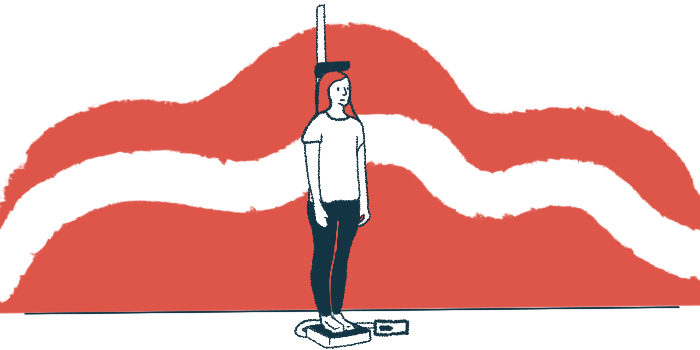Younger adults with frequent flares at risk of weight gain with Trikafta
Study looks at changes in patients' body fat 6 months after start of treatment
Written by |

Younger adults with cystic fibrosis (CF) and a history of frequent pulmonary exacerbations are more likely than other adult patients to have put on weight six months into treatment with Trikafta (ivacaftor/tezacaftor/elexacaftor), a study found.
The study, “Predicting weight gain in patients with cystic fibrosis on triple combination modulator,” was published in Pediatric Pulmonology.
Vertex Pharmaceuticals’ Trikafta has been shown to improve lung function in children and adults with CF who carry at least one copy of F508del or any other responsive disease-causing mutation in the CFTR gene.
Besides CF affecting lung health, the disease’s digestive symptoms often result in poor growth and low weight. Trikafta can help patients gain weight, particularly if they are underweight before beginning treatment. However, gaining too much weight can raise other health issues.
Larger weight gain at six months of Trikafta use seen in younger adults
To better understand factors that may predict weight gain, three researchers in the U.S. reviewed and analyzed data covering 154 adults with CF, ages 19 to 73, being followed at the University of Utah’s CF clinic. Over half (54%) were women, and pulmonary exacerbations — periods when lung symptoms suddenly worsen — across the entire group ranged from none to six in the year prior to starting on Trikafta.
Analysis revealed a link between the use of Trikafta, available as Kaftrio in Europe, and weight gain. A mathematical model predicted an average increase in body mass index (BMI), a measure of body fat based on weight and height, of 2.46 kilograms per square meter (kg/m2) at six months after starting treatment.
Younger age and a history of more frequent pulmonary exacerbations predicted larger weight gains, with BMI reducing by .045 kg/m2 for every year of age, and increasing by .32 kg/m2 for each pulmonary exacerbation in the year prior to starting Trikafta.
This information, the researchers noted, could help clinicians to better manage expectations regarding treatment and in advising their patients, particularly those younger adults most at risk, of a potential for unusual weight gain over “a multi-month period” while on Trikafta.
Patients’ weight remains an ‘important consideration’ with cystic fibrosis
“In light of previous research and the history of clinical CF, weight continues to be an important consideration to patients and clinicians alike,” the scientists wrote. “Clinicians should focus on improving or maintaining good dietary and physical activity habits.”
While informative, these results may not fully apply across settings, the researchers added. “There may be models that are better suited to specific individuals in different clinical situations,” they wrote.
In a future study with data being collected over time, roughly 300 patients with characteristics similar to those in this work would provide 90% power to replicate this study’s results, and 1,000 patients would provide 98% power, the researchers calculated.
As study limitations, they noted that it was conducted at a single adult CF center and that body composition data were not assessed. “Our practices may differ from practices elsewhere that affect weight, potentially limiting generalizability of our results. However, the results provide a starting point for studies with recruitment from a wider range of settings,” the investigators wrote.







